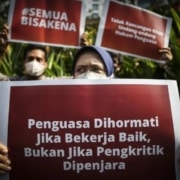
The 28 year old son of President Joko Widodo was appointed as the Chair of the Indonesian Solidarity Party (PSI) on 23 September. Photo by Narda Margaretha Sinambela for Antara.
In a highly significant move, Kaesang Pangarep, the youngest son of President Joko ‘Jokowi’ Widodo, has officially joined the Indonesian Solidarity Party (PSI).
This decision carries profound implications for the country’s political landscape, particularly in the lead-up to the 2024 presidential election.
Kaesang’s membership of PSI is a bold move. But it comes with the blessing of his father, hinting at a calculated effort from Jokowi to shape the upcoming election – and its aftermath. It raises questions about Jokowi’s determination to influence Indonesia’s future leadership, and his ambitions to build a political dynasty.
How will the Indonesian Democratic Party of Struggle (PDI-P), Jokowi’s official party, react to Kaesang’s new affiliation with PSI? And what does this mean for Jokowi’s influence in 2024 and beyond?
The millennial party
PSI was established in 2014 by journalist Grace Natali as a secular progressive party to amplify the voices of young Indonesians. Kaesang, with his social media prowess and ability to connect with young voters, offers a bridge between PSI’s ideology and the aspirations of Indonesian youth.
But this latest political marriage is also a carefully calculated maneuver designed to expand the political influence of both PSI and Jokowi. It gives PSI mainstream political appeal through a direct association with Indonesia’s popular outgoing leader. And it also gives Jokowi influence over the youth vote – particularly the Gen Z demographic – which constitutes the largest portion of voters in the 2024 election.
The repercussions for the upcoming election in Indonesia are substantial. First and foremost, the move elevates PSI’s bargaining power within the coalition landscape. Historically, small parties like PSI have only played a supporting role, but the addition of a prominent figure like Kaesang, gives PSI a new vehicle to assert its influence in coalition negotiations.
Kaesang’s involvement might also energise the crucial millennial voting bloc, potentially swinging electoral outcomes in favor of the party and its coalition partners, as young voters demand fresh perspectives and progressive policies.
Not everyone is happy
Kaesang’s alignment with PSI also reveals a curious dynamic inside the Jokowi camp, suggesting Jokowi may be diversifying his political strategy by supporting multiple parties with overlapping ideologies.
PSI has a history of supporting Jokowi, endorsing him in the 2014 and 2019 elections, but its relationship with the largest party, PDI-P, has been tense and is now likely to worsen. The openly strained relationship between Jokowi and Megawati Soekarnoputri, the chairwoman of PDI-P, is likely to cause real conflict between the two secular parties, which now become competitors.
In fact, PDI-P’s strict internal rules prohibit the family of members from affiliating with other political parties. PDI-P officials have already initiated an investigation into Kaesang’s decision, underscoring the gravity of the rift.
This presents PDI-P with a dilemma. On the one hand, strictly enforcing the rules might demand the expulsion of Jokowi from PDI-P, isolating a massive network of Jokowi loyalists. On the other hand, tolerating Kaesang’s defiance would allow PDI-P to retain the loyalty of Jokowi voters but cede influence to PSI.
A diversified dynasty
Jokowi’s decision to back a party that closely competes with PDI-P, hints at shifting alliances and a bold departure from established norms.
PSI’s proximity to Prabowo Subianto’s allies suggests Jokowi is shifting his support to Prabowo, who now serves as Defense Minister. It’s likely Jokowi is now securing a broad coalition for Prabowo’s candidacy. If true, this signals a willingness to break free from his PDI-P past.
Kaesang’s entry into the political fray also confirms what many have suspected – a new Jokowi dynasty is emerging. Since the election of Jokowi’s eldest son, Gibran Rakabuming as Mayor of Surakarta, and his son-in-law, Bobby Nasution, as Mayor of Medan, pundits have speculated about Jokowi’s dynastic aspirations.
Kaesang’s political debut with PSI removes any doubt about Jokowi’s intention to establish a political dynasty that can extend his influence beyond his own presidency.











